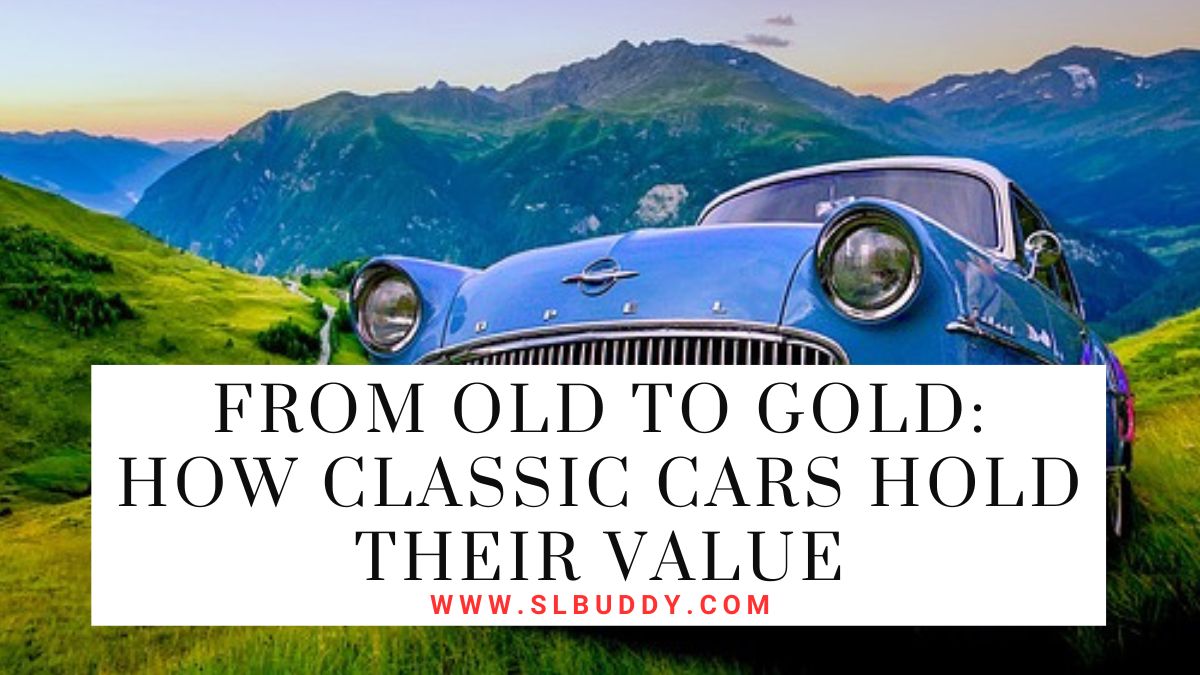
Investing in classic cars has proven time and time again to be an appealing alternative to traditional investments.
Unlike the typical assets in your portfolio, these vintage beauties offer not just financial returns, but an unmatched sense of nostalgia and satisfaction.
Their value doesn’t merely hinge on their age; it’s an intricate combination of rarity, originality, condition, and the historical significance they carry.
In the following sections, we will delve into the art and science of why classic cars hold their value and how they can be a golden investment choice.
Rarity
Classic cars are often produced in limited quantities, making them highly sought after by collectors.
This rarity makes them more valuable, as possessing something that few others have is a unique luxury.
Furthermore, the scarcity of spare parts can increase a car’s value, as maintaining and restoring such vehicles becomes a painstaking and expensive task.
The exclusivity of owning a rare car adds a sense of prestige and desirability, fueling the demand for these unique automobiles.
Moreover, the rarity of classic cars goes beyond their production numbers. It encompasses the uniqueness of their design, features, and even color combinations.
Each classic car, with its distinct characteristics and details, tells a story of craftsmanship and artistry that makes it truly one-of-a-kind.
The scarcity of specific models or variants further enhances their desirability among collectors, who value the opportunity to own a piece of automotive history that stands out from the rest.
Heritage
A car’s historical significance can enhance its value significantly. Vehicles that have been part of notable events, belonged to famous personalities or were breakthroughs in automotive history often command higher prices.
This factor is not just about the car itself but the stories it carries, adding a sense of romance and intrigue to the investment.
Owning a classic car with a rich history provides a connection to the past and allows enthusiasts to be a part of the automotive heritage.
Delving into the historical significance of classic cars reveals fascinating narratives that intertwine with broader cultural, social, and technological contexts.
These stories provide a deeper appreciation for the impact these vehicles had on shaping the automotive industry and society as a whole.
From race cars that broke speed records to cars owned by iconic figures, the historical significance of classic cars adds layers of value and interest to their ownership.
Condition
Cars that have been well-preserved or accurately restored can fetch higher prices.
Collectors often look for vehicles in original condition with matching numbers, which means that the significant parts are original and match the factory specifications.
The meticulous care and attention to detail put into maintaining the originality and integrity of a classic car make it a valuable piece of automotive history.
Another aspect of condition that adds value to classic cars is the presence of original features, accessories, and components.
From the pristine upholstery to the intact dashboard instruments, every detail contributes to the overall authenticity and charm of the vehicle.
The condition of classic cars not only reflects the care and dedication of their previous owners but also serves as a testament to the enduring quality and craftsmanship of the automobile itself.
Provenance
Provenance refers to the car’s history and documentation, which can significantly influence its price.
Adequate records such as receipts, old photos, original manuals, and even original sale documents can boost the car’s value since they provide a verified history that can intrigue potential buyers.
Detailed documentation not only adds credibility but also adds an extra layer of confidence to buyers, assuring them of the car’s authenticity and provenance.
Furthermore, the documentation of a classic car’s ownership history can unveil intriguing stories and connections.
These records often reveal the car’s previous owners, their experiences, and even any modifications or unique features added along the way.
The ability to trace a classic car’s journey through time adds a sense of fascination and completeness to its story, making it even more desirable to collectors and enthusiasts.
Brand and Model
The brand and model of the car are key factors in determining its value. Iconic brands like Ferrari, Rolls-Royce, and Aston Martin, known for their craftsmanship, performance, and aesthetic appeal, tend to hold their value.
Similarly, models that were popular or innovative during their time are more likely to be coveted by collectors.
The reputation and prestige associated with certain brands and models ensure that they remain highly desirable and sought after in the classic car market.
Moreover, the brand and model of a classic car can also reflect the broader cultural and historical context in which it was produced.
These vehicles often embody the pinnacle of automotive design and engineering of their respective eras, representing the aspirations and achievements of their time.
The enduring appeal of prestigious marques stems from their ability to encapsulate the essence of luxury, elegance, and innovation, making them timeless symbols of automotive excellence.
Market Trends
Market trends can have a substantial impact on the value of classic cars. Popular culture, such as movies and TV shows, can suddenly make certain models more desirable.
Economic conditions also play a role; during prosperous times, people are more willing to invest in luxury assets like classic cars.
Additionally, emerging trends in automotive collecting, such as the growing interest in electric classic cars or the demand for vintage SUVs, can also shape the market and affect the value of certain models.
The influence of pop culture on classic car values is evident in the way certain movies or TV series can create a surge in demand for specific models.
The association of a classic car with a beloved character or a memorable scene can ignite the imagination of enthusiasts and collectors, driving up prices and creating a new wave of interest.
Economic factors, such as changes in disposable income or investment preferences, can also sway the demand and supply dynamics in the classic car market, leading to fluctuations in values.
Demand versus Supply
The principle of demand and supply applies to classic cars as well. If a particular model is in high demand but low supply, its value is likely to increase.
Conversely, if a model is readily available but not in demand, its value may not appreciate significantly. Amidst the diverse spectrum of collectible automobiles, there are certain timeless cars available that continue to captivate car enthusiasts and collectors alike, thanks to their unrivaled design, extraordinary craftsmanship, and rich historical significance.
Factors such as limited production numbers, desirability, and scarcity of certain models contribute to the delicate balance between demand and supply in the classic car market, ultimately influencing their value and investment potential.
Understanding the dynamics of demand and supply in the classic car market requires considering various factors.
The popularity of specific models among collectors and enthusiasts, the availability of spare parts, and even the geographic distribution of classic cars all play a role in shaping the market.
Moreover, factors such as changes in regulations, technological advancements, and shifting social preferences can also impact the demand and supply of classic cars, making it a dynamic and ever-evolving landscape.
Investment Potential
Despite the complexities involved, investing in classic cars can be quite profitable. They are tangible assets that do not depreciate like new cars.
Instead, their value can grow over time, offering potential returns that can outpace traditional investments.
However, as with any investment, it’s important to conduct thorough research and consider the costs of storage, maintenance, and insurance.
Understanding the intricacies of the classic car market and having a long-term investment strategy can maximize the investment potential of these unique and captivating vehicles.
The investment potential of classic cars lies in their ability to combine financial returns with the sheer joy of ownership and appreciation for automotive history.
While the value of individual classic cars can fluctuate, the overall trend has shown that well-preserved and sought-after models tend to increase in value over time.
Additionally, classic cars offer the opportunity for enthusiasts to enjoy and showcase their passion for automotive design and craftsmanship while potentially reaping financial rewards.
However, it’s important to note that investing in classic cars requires careful consideration, knowledge, and a genuine love for these remarkable machines.
Don’t miss: Improve Your Home Budget With These Profitable Ideas
The bottom line
Classic cars are more than just vehicles; they are moving pieces of history with an intrinsic value that can rise over time.
Their worth hinges on a blend of factors including rarity, historical significance, condition, provenance, brand, and model.
Along with these factors, market trends and the fundamental principle of demand versus supply also play a vital role.
While investing in classic cars holds the potential for substantial financial rewards, it is imperative to remember that it likewise demands a deep understanding of the market, comprehensive research, and a profound passion for these timeless beauties.
In the end, the allure of classic cars transcends their financial value – it’s about the love for craftsmanship, the thrill of nostalgia, and the privilege of preserving a piece of automotive history.














